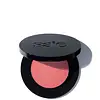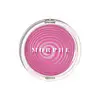What's inside
What's inside
 Key Ingredients
Key Ingredients

 Benefits
Benefits

 Concerns
Concerns

 Ingredients Side-by-side
Ingredients Side-by-side

Caprylic/Capric Triglyceride
MaskingOctyldodecanol
EmollientCalcium Sodium Borosilicate
Mica
Cosmetic ColorantSynthetic Fluorphlogopite
Helianthus Annuus Seed Wax
Skin ConditioningSynthetic Beeswax
Emulsion StabilisingSilica
AbrasiveTin Oxide
AbrasiveAleurites Moluccanus Seed Oil
Skin ConditioningPassiflora Edulis Seed Oil
EmollientEthylhexyl Palmitate
EmollientHelianthus Annuus Seed Oil
EmollientVictoria Amazonica Flower Extract
Skin ConditioningTrihydroxystearin
Skin ConditioningSodium Hyaluronate
HumectantGlucomannan
Skin ConditioningCI 77891
Cosmetic ColorantCI 77491
Cosmetic ColorantCI 77492
Cosmetic ColorantCI 77499
Cosmetic ColorantCI 77510
Cosmetic ColorantCI 15850
Cosmetic ColorantCaprylic/Capric Triglyceride, Octyldodecanol, Calcium Sodium Borosilicate, Mica, Synthetic Fluorphlogopite, Helianthus Annuus Seed Wax, Synthetic Beeswax, Silica, Tin Oxide, Aleurites Moluccanus Seed Oil, Passiflora Edulis Seed Oil, Ethylhexyl Palmitate, Helianthus Annuus Seed Oil, Victoria Amazonica Flower Extract, Trihydroxystearin, Sodium Hyaluronate, Glucomannan, CI 77891, CI 77491, CI 77492, CI 77499, CI 77510, CI 15850
Ethylhexyl Palmitate
EmollientPentaerythrityl Tetraisostearate
EmollientSynthetic Fluorphlogopite
Polymethylsilsesquioxane
Hydrogenated Microcrystalline Wax
Emulsion StabilisingBis-Diglyceryl Polyacyladipate-2
EmollientHdi/Trimethylol Hexyllactone Crosspolymer
Silica
AbrasiveSynthetic Wax
AbrasiveCeresin
Emulsion StabilisingPhenoxyethanol
PreservativeCocos Nucifera Oil
MaskingCI 77120
Cosmetic ColorantTocopheryl Acetate
AntioxidantHydrolyzed Vegetable Protein
Skin ConditioningHelianthus Annuus Seed Oil
EmollientAluminum Hydroxide
EmollientBambusa Vulgaris Extract
Skin ConditioningRosin
Tin Oxide
AbrasiveTrihydroxystearin
Skin ConditioningSodium Hyaluronate
HumectantGlucomannan
Skin ConditioningCI 77891
Cosmetic ColorantCI 15850
Cosmetic ColorantCI 19140
Cosmetic ColorantCI 42090
Cosmetic ColorantIron Oxides
Ethylhexyl Palmitate, Pentaerythrityl Tetraisostearate, Synthetic Fluorphlogopite, Polymethylsilsesquioxane, Hydrogenated Microcrystalline Wax, Bis-Diglyceryl Polyacyladipate-2, Hdi/Trimethylol Hexyllactone Crosspolymer, Silica, Synthetic Wax, Ceresin, Phenoxyethanol, Cocos Nucifera Oil, CI 77120, Tocopheryl Acetate, Hydrolyzed Vegetable Protein, Helianthus Annuus Seed Oil, Aluminum Hydroxide, Bambusa Vulgaris Extract, Rosin, Tin Oxide, Trihydroxystearin, Sodium Hyaluronate, Glucomannan, CI 77891, CI 15850, CI 19140, CI 42090, Iron Oxides
 Reviews
Reviews

Ingredients Explained
These ingredients are found in both products.
Ingredients higher up in an ingredient list are typically present in a larger amount.
Ci 15850 is the pigment color red. It is an azo dye and created synthetically.
Azo dyes need to be thoroughly purified before use. This allows them to be more stable and longer-lasting.
This ingredient is common in foundations, lipsticks, and blushes. This color is described as brown/orangey red.
It has many secondary names such as Red 6 and Red 7. According to a manufacturer, Red 6 usually contains aluminum.
Learn more about CI 15850Ci 77891 is a white pigment from Titanium dioxide. It is naturally found in minerals such as rutile and ilmenite.
It's main function is to add a white color to cosmetics. It can also be mixed with other colors to create different shades.
Ci 77891 is commonly found in sunscreens due to its ability to block UV rays.
Learn more about CI 77891Ethylhexyl Palmitate, also known as octyl palmitate, is created from 2-ethylhexyl alcohol and palmitic acid. It is a fatty acid ester.
The fatty acid content of Ethylhexyl Palmitate makes it an emollient. Emollients help soften and hydrate your skin by trapping moisture within.
Ethylhexyl Palmitate is also used to help improve the texture of cosmetics. It helps other ingredient dissolve in products and help disperse ingredients more evenly.
You'll likely find this ingredient in sunscreen, as it is often used to mix UV-blocking ingredients such as avobenzone and ethylhexyl triazone.
It can also help stabilize the fragrances in a product as a fragrance fixative.
Ethylhexyl Palmitate can be used to substitute mineral oil.
Due to its high fatty acid content, it may not be fungal-acne safe.
Learn more about Ethylhexyl PalmitateGlucomannan is a fiber created from the Konjac plant. It is an emulsifier and thickener.
The high polysaccharide content makes it great at adjusting the texture of products. (Kind of like starch).
Polysaccharides also help our skin stay hydrated.
This ingredient is water-soluble.
Learn more about GlucomannanHelianthus Annuus Seed Oil is the oil derived from the seeds of a Sunflower. Sunflower seed oil is non-fragrant. It is an emollient, meaning it helps to soften the skin.
Sunflower seed oil contains many fatty acids. The fatty acids found in sunflower seeds include (from highest amount to least): linoleic acid, myristic acid, palmitic acid, stearic acid, arachidic acid, oleic acid, and linolenic acid.
These fatty acids help the skin create ceramides. Ceramides play a role in repairing the skin barrier.
Helianthus Annuus Seed Oil helps moisturize the skin. This in turn helps the skin look more rejuvenated and smoother.
Sunflowers are rich in vitamin E.
Historians believe Indigenous cultures of North America domesticated sunflowers before corn. Thus they relied on sunflower oil for a variety of uses. One such use is moisturizing skin and hair.
Sunflower seed oil may not be fungal acne safe. We recommend speaking with a professional if you have any concerns.
Learn more about Helianthus Annuus Seed OilSilica, also known as silicon dioxide, is a naturally occurring mineral. It is used as a fine, spherical, and porous powder in cosmetics.
Though it has exfoliant properties, the function of silica varies depending on the product.
The unique structure of silica enhances the spreadability and adds smoothness, making it a great texture enhancer.
It is also used as an active carrier, emulsifier, and mattifier due to its ability to absorb excess oil.
In some products, tiny microneedles called spicules are made from silica or hydrolyzed sponge. When you rub them in, they lightly polish away dead skin layers and enhance the penetration of active ingredients.
Learn more about SilicaSodium Hyaluronate is hyaluronic acid's salt form. It is commonly derived from the sodium salt of hyaluronic acid.
Like hyaluronic acid, it is great at holding water and acts as a humectant. This makes it a great skin hydrating ingredient.
Sodium Hyaluronate is naturally occurring in our bodies and is mostly found in eye fluid and joints.
These are some other common types of Hyaluronic Acid:
Learn more about Sodium HyaluronateSynthetic Fluorphlogopite is the synthethic version of mica. It consists of fluorine, aluminum and silicate.
Synthetic Fluorphlogopite is used to add volume to products.
It is considered non-irritating on the skin.
Learn more about Synthetic FluorphlogopiteTin Oxide is an inorganic oxide used to add opacity and volume to a product. In nature, it is already found in mineral form. The main ore of tin is an opaque and shiny mineral called casseterite.
Tin Oxide helps remove translucency in a product, or make it more opaque. Besides adding opacity, tin oxide is used for bulking to add volume.
This ingredient comes from Hydroxystearic Acid, a fatty acid, and glycerin. It is used to thicken oils.
Due to its fatty acid content, it is a natural emollient.
Creating trihydroxystearin involves using a chemical reaction between hydrogen and castor oil.
This ingredient may not be Malassezia folliculitis safe.
Learn more about Trihydroxystearin